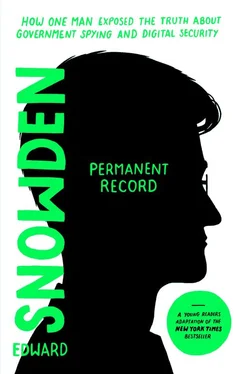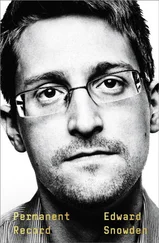So let me try to find a way to talk about the practical in terms other than best practices. Let me try to talk about change, because the struggle that begins with you changing your own habits must ultimately end with changes to technology, and changes to law—with change being brought to the world.
Every time you go online, you need to know the current rules of the game if you want to have any chance of controlling what happens next. You should be aware of the strengths and weaknesses of the tools you rely on to connect and protect you, along with the many ways the sites and systems on the other end intend to track and exploit you. Two organizations that I trust, the Electronic Frontier Foundation (eff.org) and the Freedom of the Press Foundation (freedom.press), publish useful guides that can get you up to speed on surveillance self-defense, from scrubbing the identifying tags invisibly hidden in your photos by your phone to encrypting your data with even better techniques than the ones I used to stand up against the NSA.
Once a solid foundation is acquired, you might want to get involved with the Open Source movement. A great way of doing that is through the Free Software Foundation (fsf.org).
To get involved in the ongoing discussions of technology’s intersections with civil liberties, you can’t do better than seeking out the ACLU (aclu.org); for technology’s intersection with climate science, I’d recommend 350.org.
When I started thinking about putting together a version of my book for younger readers, I realized that I wanted to write a final chapter directly addressing my own protocols—the steps I take to keep secure online—a subject I’m continually asked about. When I sat down to write this book, I didn’t just open up a Microsoft Word document and type in it, and then attach the document to an email to my publisher sent from an account like edwardjsnowden@gmail.com or Sys-Admin@apple.com. Instead, I wrote it in an Open Source word-processing program, LibreOffice Writer, running on a “virtual machine” that never connects to the internet. I then encrypted the finished document, transferred the encrypted copy to write-once media, which I then moved onto a different computer that goes online only through the anonymity-friendly Tor network. From there, I uploaded the encrypted file to a file-sharing site that doesn’t require a log-in, and using another virtual machine pretending to be a phone, I sent the password to the encrypted file to my publisher using the Signal messenger.
If that sounds like babble to you, remember that there was a time when none of it meant anything to me, either. Besides, sometimes you aren’t trying to beat the NSA, you’re just trying to keep your kid brother or sister out of your browsing history or a jealous ex from stalking you. You yourself may not have to go through every step of this process in order to just send an email, but maybe a single technique—whether you’re protecting your identity, your location, your contacts, or just the content of what you say and share online—will one day be of help.
In general, I think it’s important to remember that no matter how quickly the internet changes, you yourself change, too. Some of the best advice I can give is to start thinking about the future as you already think about the past: You know you’ve changed so much in the past decade, so imagine how much you will continue to change as you get older. So much of good online habits come from merely recalling this fact, and the importance of giving yourself the opportunity to reinvent who you are. This involves a significant amount of self-forgiveness, for example, forgiving yourself for past views that you expressed online but may no longer hold, but it also involves extending that forgiveness to others, who are surely going through the same process of continuous growth.
Ultimately, our privacy is collective: Yours depends on your classmates’ and friends’, and theirs depends on yours. Remember that anything you share can be reshared and eventually reach the eyes and ears of those for whom it was never originally intended. We should never make assumptions about people, least of all about what they consider public or private or secret. A good steward is a perennial good student: someone who’s never too afraid to ask, Can I share this and with whom? When and where, if and how?
In May 2013, as I sat in that hotel room in Hong Kong wondering whether any journalists would show up to meet me, I’d never felt more alone. Seven years later, I find myself in quite the opposite situation, having been welcomed into an extraordinary and ever-expanding global tribe of journalists, lawyers, technologists, and human rights advocates to whom I owe an incalculable debt. At the conclusion of a book, it’s traditional for an author to thank the people who helped make the book possible, and I certainly intend to do that here, but given the circumstances, I’d be remiss if I didn’t also thank the people who have helped make my life possible—by advocating for my freedom and, especially, by working ceaselessly and selflessly to protect our open societies as well as the technologies that have brought us, and that bring everyone, together.
Over the last nine months, Joshua Cohen has taken me to writing school, helping to transform my rambling reminiscences and capsule manifestos into a book that I hope he can be proud of.
Chris Parris-Lamb proved himself a shrewd and patient agent, while Sam Nicholson provided astute and clarifying edits and support, as did the entire team at Macmillan, from Gillian Blake to Sara Bershtel, Riva Hocherman, Grigory Tovbis, and Brian Geffen. Thank you, Catherine Frank, for your help on the young readers adaptation.
The success of this team is a testament to its members’ talents, and to the talents of the man who assembled it—Ben Wizner, my lawyer, and, I am honored to say, my friend.
In the same vein, I’d like to thank my international team of lawyers who have worked tirelessly to keep me free. I would also like to thank Anthony Romero, the ACLU’s director, who embraced my cause at a time of considerable political risk for the organization, along with the other ACLU staff who have helped me throughout the years, including Bennett Stein, Nicola Morrow, Noa Yachot, and Daniel Kahn Gillmor.
Additionally, I’d like to acknowledge the work of Bob Walker, Jan Tavitian, and their team at the American Program Bureau, who have allowed me to make a living by spreading my message to new audiences around the world.
Trevor Timm and my fellow board members at the Freedom of the Press Foundation have provided the space and resources for me to return to my true passion, engineering for social good. I am especially grateful to our CTO Micah Lee, former FPF operations manager Emmanuel Morales, and current FPF board member Daniel Ellsberg, who has given the world the model of his rectitude, and given me the warmth and candor of his friendship.
This book was written using free and open-source software. I would like thank the Qubes Project, the Tor Project, and the Free Software Foundation.
My earliest intimations of what it was like to write against deadline came from the masters, Glenn Greenwald, Laura Poitras, Ewen MacAskill, and Bart Gellman, whose professionalism is informed by a passionate integrity. Having been edited now myself, I have gained a new appreciation of their editors, who refused to be intimidated and took the risks that gave meaning to their principles.
My deepest gratitude is reserved for Sarah Harrison.
And my heart belongs to my family, extended and immediate—to my father, Lon; to my mother, Wendy; and to my brilliant sister, Jessica.
The only way I can end this book is the way I began it: with a dedication to Lindsay, whose love makes life out of exile.
Читать дальше












